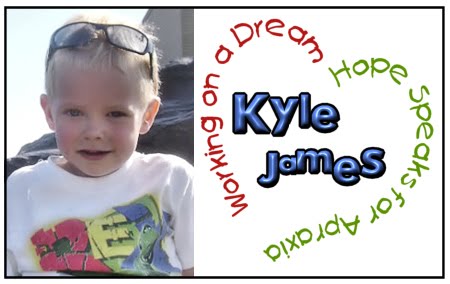My son is diagnosed with Childhood Apraxia of Speech(CAS). It is a neurological disorder that affects the speech motor planning part of the brain. It is a disability that affects many children, yet few people have heard of the disorder. CAS affects each diagnosed individual differently. Some apraxic children learn to speak , for others it can be a life-long journey. The future is uncertain for apraxic children as to whether or not they will speak clearly.
Kyle was evaluated by the Birth to Three(Early Intervention) program at about 19 months. I suspected something wasn't right by the time he turned 1 year old, but waited a little longer just because everyone gave me the "wait and see" lecture. He went to daycare starting at 12 weeks and all the other children his same age were way beyond him in speech development and it was a difficult thing to watch. It still is. :-(
At around 26 months I went to a pediatric developmental specialist at my son's clinic and asked for a referral to a private SLP. The SLP diagnosed him instantly at his first evaluation with apraxia. He has been going to a private SLP for about a year now with little to no progress. It can be a long road with little progress. And some children progress faster than others. Apraxia affects each child differently.
When Kyle turned 3 this past May, he transitioned into the Early Childhood Special Education. It runs with the school system and the school year. He goes mornings to Early Childhood and also gets speech and occupational therapy while there. It is summer break right now, so in September he will be starting up again.
Since Kyle is making such little progress, we will be looking into alternative communication. He needs to have a way to communicate with others or he will suffer both socially and academically. He knows some sign language, which helps him with his asking for requests. We will be trialing some Alternative Augmentative Communications(AAC) devices as soon as his private SLP sets up the reps to come and demo them. He will get a 4 week trial for the AAC devices before we will select one that we think will work best for him. This is where we are at right now. Kyle gets private speech 3-4 x week at 45 minute intervals. His SLP is using both Strand and Kaufmann methods as part of his therapy, but Kyle does not have good vocal imitation at this point, so these methods are very slow in working. We are meeting with Dr. Edythe Strand at Mayo Clinic in Rochester Minnesota in the near future and are excited for this evaluation and consultation with her. She is a renowned expert in the field of apraxia.
I feel blessed that Kyle's only disability is that of speech and language. My priority lies in helping my son find his voice and reach his dream of speaking.
Pages
The Facts

- June 3, 2010-A New Beginning
- June 10-(-5)
Followers
Swidget 1.0
About Me
- Kathy
- I am a full time mom and I work a full time job outside of the home. My son is my priority in life. My main focus is to be an advocate for my son as I try to balance my busy life.
Apraxia Links
Recipe Websites
My Favorite Recipes
Blog Archive
Labels
- apraxia (1)


0 comments:
Post a Comment